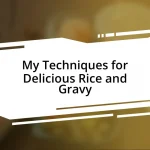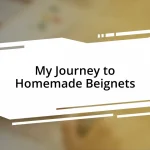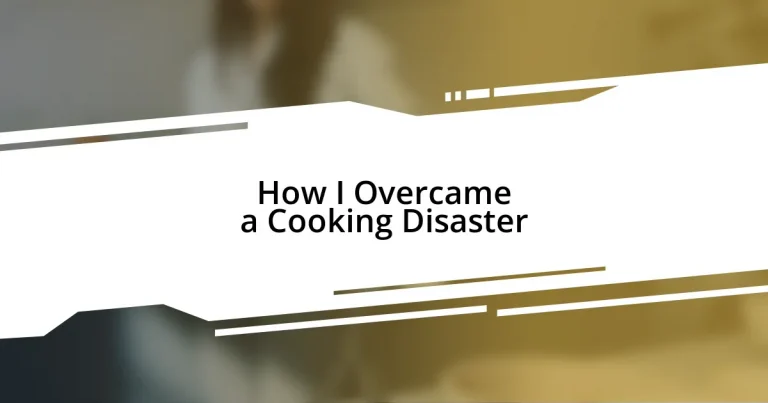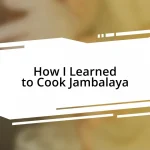Key takeaways:
- Cooking disasters often provide valuable lessons in resilience and growth, encouraging cooks to embrace mistakes as opportunities.
- Key causes of cooking failures include miscalculations, distractions, and poor ingredient quality, emphasizing the importance of focus and preparation.
- Techniques for recovery from mistakes involve improvisation, flavor adjustment, and turning mishaps into learning opportunities with friends.
- Embracing the kitchen as a safe space for exploration and having a backup plan can help turn potential failures into memorable successes.
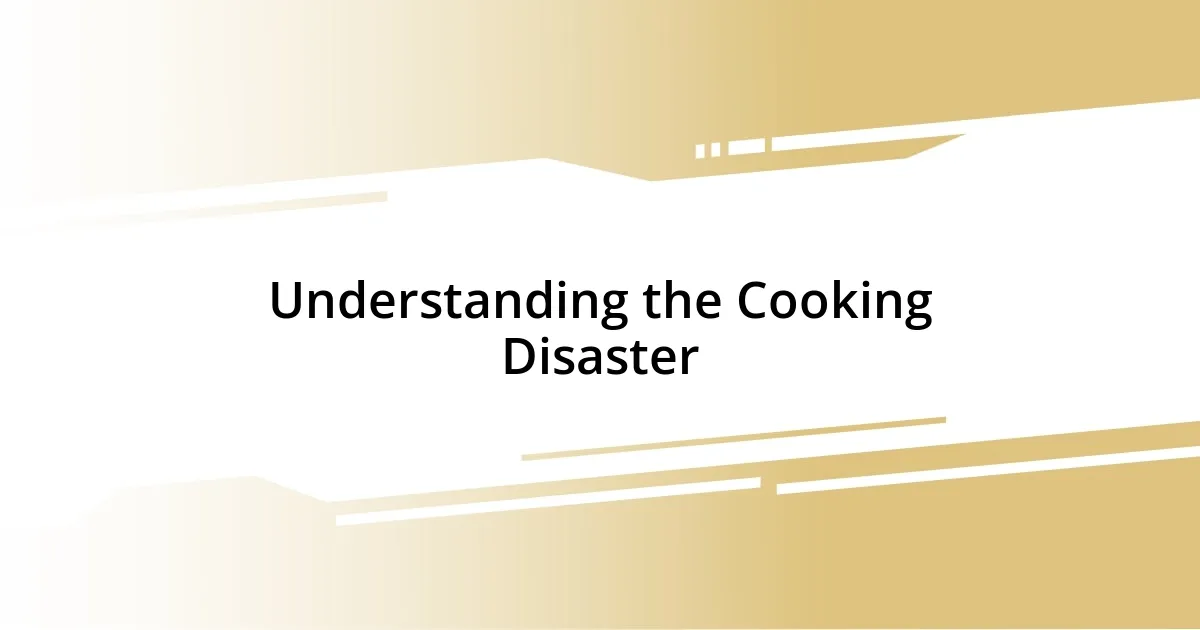
Understanding the Cooking Disaster
One moment, you’re confidently sautéing vegetables, and the next, you’ve scorched them beyond recognition. I’ll never forget the time I tried to impress my friends with a homemade risotto. Instead of creamy perfection, I ended up with a sticky, overcooked mess. It’s these sudden shifts in cooking that can really shake your confidence, isn’t it?
Understanding a cooking disaster goes beyond just the food itself; it taps into our emotions and expectations. When I faced the burnt risotto, I felt a wave of embarrassment wash over me—why couldn’t I get something so simple right? Can you relate? Cooking can feel like a personal reflection of our skills, and disasters can sting much deeper than we expect.
At the heart of every cooking disaster lies a lesson waiting to be uncovered. Whether it’s misreading a recipe or underestimating cooking times, these mishaps teach us resilience. I’ve learned to embrace those moments, even when they feel like culinary failures. Instead of throwing in the towel, I now see cooking disasters as stepping stones toward better meals. How do you view your cooking accidents?

Identifying the Root Causes
Identifying the root causes of cooking disasters is essential for growth in the kitchen. One of my biggest missteps in the culinary arts was when I mistakenly added a tablespoon instead of a teaspoon of salt to my soup. The salty taste lingered long after the soggy bread had absorbed every drop, and the realization hit me: Small miscalculations can lead to major mistakes. Have you ever found yourself in a similar pickle?
Another cause that often lurks beneath the surface is kitchen distractions. I vividly remember a time when I was juggling a phone call while attempting to boil pasta. Amidst the chatter, I lost track of the time and ended up with a pot of mushy noodles. This incident taught me that focus is crucial; even a moment of distraction can lead to a total culinary breakdown. Have you ever felt that tension in your kitchen with too many things competing for your attention?
Lastly, ingredient quality can be the hidden culprit in many cooking failures. I once used expired baking powder for a cake, expecting a lovely rise, but instead it turned out flat and dense. The disappointment was palpable, but it reinforced the importance of checking your ingredients. Fresh and quality ingredients not only enhance taste but also contribute to the overall success of your dish. Isn’t it fascinating how something so seemingly simple can have a profound effect on the outcome?
| Root Cause | Description |
|---|---|
| Miscalculations | Small measuring errors can ruin the flavor balance of your dish. |
| Distractions | Divided attention can lead to forgetting crucial steps, resulting in overcooked or underdone food. |
| Ingredient Quality | Using expired or poor-quality ingredients can significantly affect the texture and flavor of your meal. |
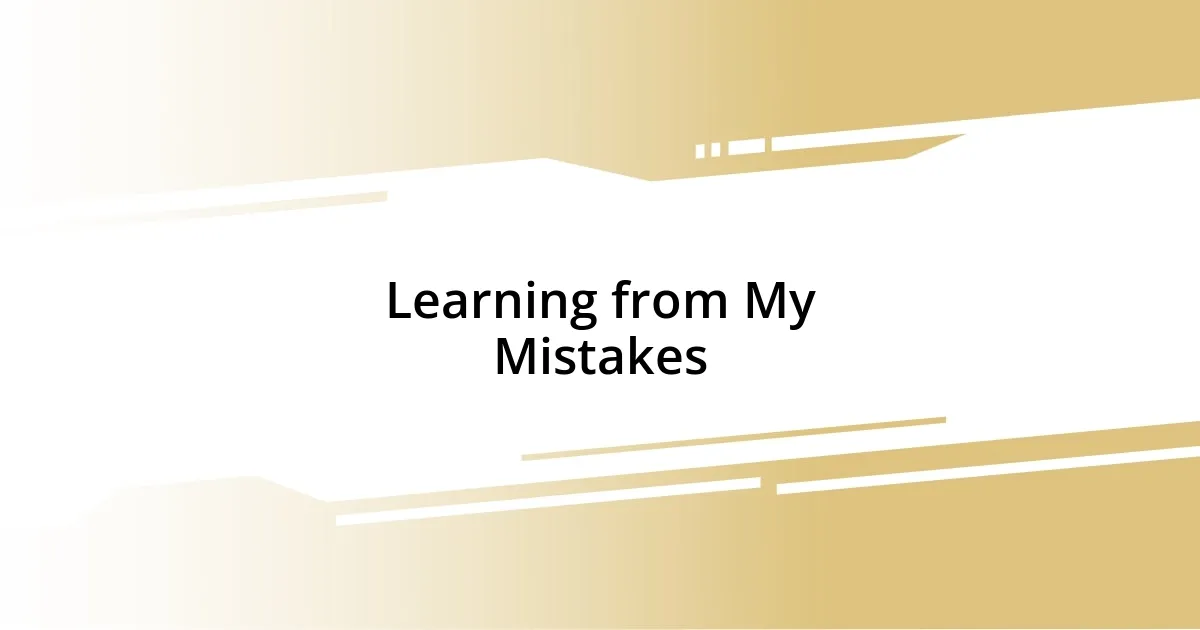
Learning from My Mistakes
When I reflect on my kitchen blunders, I realize they are like hidden gems of wisdom. Each mistake has taught me something valuable, reminding me that growth often comes from failure. I can still see myself gaping at a lumpy sauce that I’d hoped would impress—a true letdown that pushed me to question my techniques. That disappointment morphed into motivation; I learned to take meticulous notes during my cooking sessions to track what worked and what didn’t. Have you ever turned a culinary failure into your teaching moment?
Here are some lessons I’ve embraced from my most memorable mishaps:
– Precision Matters: I once added garlic powder instead of the fresh cloves I thought I had. The flavor was all wrong, solidifying my belief that every ingredient counts.
– Take Your Time: A rushed pie crust ended up more like a biscuit than the flaky goodness I envisioned. I learned to slow down and savor the process, treating cooking as a journey rather than a race.
– Keep Experimenting: The time I tried to get creative with ingredients and added a spicy pepper to a beloved mac and cheese almost sent it over the edge. But it turned out to be the best accident ever! Now, I approach each dish with a sense of adventure.
These experiences, while initially disheartening, shaped my approach to cooking. They became valuable stepping stones to a more confident and deliberate culinary style. Isn’t it amazing how our stumbles can pave the way for growth?

Techniques for Recovery
One technique I highly recommend is improvisation. There was a time when I burned my famous garlic bread right before hosting a dinner party. In a panic, I sliced the top off each piece and melted some cheese on the crispy base. Surprisingly, my friends loved the cheesy twists, and I learned that quick thinking can transform a disaster into a new favorite. Have you ever had to get creative in a pinch like that?
Another method is to adjust flavors on the fly. I recall a particularly salty stew disaster, where I quickly tossed in some extra vegetables and water to balance things out. As they simmered, the flavors melded beautifully, and that stew turned into a hearty and satisfying dish. Have you faced a situation where a little adjustment saved the meal?
Lastly, consider turning the mishap into a learning opportunity. After a pie crust that crumbled rather than rolled, I decided to host a baking night with friends where we shared our blunders and learned together. This not only made me more confident but also transformed my kitchen escapades into fun group activities. What better way to recover than with laughter and camaraderie?

Tips for Future Success
One crucial tip for future success is to embrace your kitchen as a safe space for exploration. I remember attempting a new dish that I had watched a chef prepare on TV. The pressure to replicate his flair was intimidating, but I pushed through, reminding myself that cooking is about enjoyment and self-expression. Have you ever felt that tension while trying something new? I’ve learned that even if the outcome doesn’t match the original vision, the experience itself can be immensely rewarding.
Another essential insight is the importance of preparation, often referred to as mise en place in cooking. One evening, I stumbled through a recipe, hunting for ingredients at the last minute. This chaotic approach led to missing out on key components, and my dish suffered as a result. Since then, I make it a practice to gather and measure everything beforehand. Has this ever happened to you? Setting the stage allows me to focus on the actual cooking rather than scrambling at the last moment.
Finally, I find that having a backup plan can be a lifesaver. One night, I attempted a fancy risotto that turned out too thick and clumpy. Instead of serving it as is, I transformed it into a delicious arancini by rolling them into balls and frying them! The laughter shared with my friends over my culinary twist was priceless. Isn’t it comforting to know that even a perceived failure can lead to something delightful? Embracing flexibility and adaptability can truly turn cooking disasters into memorable moments.

Sharing My Experience
Sharing my experience in the kitchen has been quite a journey, marked by a few laughable fails. I still chuckle when I think about the time I attempted to whip up a soufflé for a romantic dinner. Let’s just say it didn’t rise, quite literally! Instead of feeling defeated, I turned it into a savory pancake. Sometimes, our biggest blunders can lead to delicious surprises.
Another memorable moment was the time I decided to bake a cake for a friend’s birthday. The recipe was simple enough, but somewhere between measuring flour and pouring in sugar, I mistakenly grabbed salt instead. I tasted it, and my heart sank—I had never tasted anything so dreadful! Rather than toss the whole thing out, I repurposed it into cupcakes and drowned them in a decadent chocolate frosting. Wasn’t the frosting the true hero of that disaster? It was a reminder that creativity can emerge from chaos.
Then, there’s that uneasy feeling every cook faces when recipes don’t go as planned. I remember flipping pancakes one Saturday morning, only to watch the first few burn while I tried to control the heat. That sensation of panic almost overtook me, but instead, I grabbed some bananas, mashed them up, and created a delightful banana pancake mix. It turned a rushed breakfast into a tasty treat, proving that even in cooking, embracing imperfection often leads to the best outcomes. Have you found joy in the unexpected turns of your kitchen adventures?








